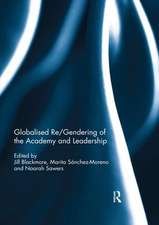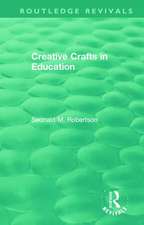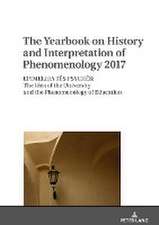Pedagogies of Taking Care: Art, Pedagogy and the Gift of Otherness
Autor Dennis Atkinsonen Limba Engleză Paperback – 24 ian 2024
| Toate formatele și edițiile | Preț | Express |
|---|---|---|
| Paperback (1) | 191.92 lei 6-8 săpt. | |
| Bloomsbury Publishing – 24 ian 2024 | 191.92 lei 6-8 săpt. | |
| Hardback (1) | 569.53 lei 6-8 săpt. | |
| Bloomsbury Publishing – 27 iul 2022 | 569.53 lei 6-8 săpt. |
Preț: 191.92 lei
Preț vechi: 249.67 lei
-23% Nou
Puncte Express: 288
Preț estimativ în valută:
36.73€ • 39.88$ • 30.85£
36.73€ • 39.88$ • 30.85£
Carte tipărită la comandă
Livrare economică 22 aprilie-06 mai
Preluare comenzi: 021 569.72.76
Specificații
ISBN-13: 9781350288362
ISBN-10: 1350288365
Pagini: 272
Ilustrații: 10 bw illus
Dimensiuni: 156 x 234 x 25 mm
Greutate: 0.37 kg
Editura: Bloomsbury Publishing
Colecția Bloomsbury Academic
Locul publicării:London, United Kingdom
ISBN-10: 1350288365
Pagini: 272
Ilustrații: 10 bw illus
Dimensiuni: 156 x 234 x 25 mm
Greutate: 0.37 kg
Editura: Bloomsbury Publishing
Colecția Bloomsbury Academic
Locul publicării:London, United Kingdom
Caracteristici
Argues for greater focus on care and civic values in education which are under attack in today's neoliberal economic climate
Notă biografică
Dennis Atkinson is Professor Emeritus at Goldsmiths, University of London, UK. He is the author of five books, including Art, Disobedience and Ethics (2017). In 2015 he was awarded The Ziegfield Award by the United States Society for Education Through Art for outstanding international contributions to art in education.
Cuprins
Introduction: An Ethico-Aesthetic Project for a Pedagogy of Taking Care1. Changing the Value of the Currency in Pedagogic Work2. Pedagogy, Conditions and Value3. Gilbert Simondon's Transduction and Pedagogic Practice4. On the Idea of Speculative Pedagogies5. The Scandal of the Truth of Art and its Implications for Art in Education6. The Gift of Otherness7. Pedagogic Work and Art Practice8. Pedagogy of the IntersticesConclusionReferences Index
Recenzii
In Pedagogies of Taking Care Dennis Atkinson offers a tour de force of contexts, theories, artworks, and analyses that move anyone who is familiar with his work to state that this could possibly be the most comprehensive and powerful of all his most recent books.
Philosophically this is an important work; it digs deep into the concepts of learning and pedagogy, locating them into the broader steams of contemporary theoretical thinking. Atkinson's comprehensive grasp and application of current philosophical trends provide new and profound insights into the fundamental nature of teaching and learning.
In this fascinating new book, Atkinson introduces a 'pedagogy of taking care' as a process of learning to receive the gift of otherness with grace. Yet with this grace also comes a ferocity that viscerally refuses neo-liberal imperatives that have taken hold of global education systems over the past two decades. For Atkinson this graceful disobedience is not embodied by the familiar shape of the rebel individual, but is found instead in the processual interstices of collective pedagogical life. Atkinson thus invites us to take a crucial leap forward in response to a burning contemporary question: how do we forge an education that truly values, and cares for, difference? In answer Atkinson draws on numerous philosophers and social theorists to construct a new ground for common sense, in the Whiteheadian mode of differentially shared experiential knowledge. If difference is ultimately all we have in common, and therefore our only currency for educational change, then Atkinson offers valuable new tools for charting this adventure into pluralism.
Philosophically this is an important work; it digs deep into the concepts of learning and pedagogy, locating them into the broader steams of contemporary theoretical thinking. Atkinson's comprehensive grasp and application of current philosophical trends provide new and profound insights into the fundamental nature of teaching and learning.
In this fascinating new book, Atkinson introduces a 'pedagogy of taking care' as a process of learning to receive the gift of otherness with grace. Yet with this grace also comes a ferocity that viscerally refuses neo-liberal imperatives that have taken hold of global education systems over the past two decades. For Atkinson this graceful disobedience is not embodied by the familiar shape of the rebel individual, but is found instead in the processual interstices of collective pedagogical life. Atkinson thus invites us to take a crucial leap forward in response to a burning contemporary question: how do we forge an education that truly values, and cares for, difference? In answer Atkinson draws on numerous philosophers and social theorists to construct a new ground for common sense, in the Whiteheadian mode of differentially shared experiential knowledge. If difference is ultimately all we have in common, and therefore our only currency for educational change, then Atkinson offers valuable new tools for charting this adventure into pluralism.


















